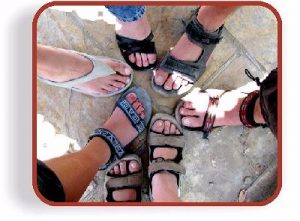Corinth is not only a Greek polis mentioned in the New Testament, but also a modern city not far from its ancient predecessor’s location. But the people I am writing about are connected to the biblical Corinth much more than to the modern. I never thought of calling them so until I began my preparations for a series of lectures at the Haifa Theological Institute – a 15-hour course on Paul’s first epistle to the Corinthians.
 In fact, I should not use the word “them,” because it’s us – Israeli believers in Jesus. They will be in my class, coming from Haifa, the smaller towns adjacent to it, and even from as “far away” as Upper Nazareth. (The quote marks betray the irony of an ex-Russian; sorry about that – in this tiny country of ours 40 kilometers is a considerable distance, you know…) If you’re familiar with the famous rhetorical question “What indeed has Athens to do with Jerusalem” posed by the second-century theologian Tertullian, you might paraphrase it: “What indeed has ancient Corinth to do with modern Haifa?”
In fact, I should not use the word “them,” because it’s us – Israeli believers in Jesus. They will be in my class, coming from Haifa, the smaller towns adjacent to it, and even from as “far away” as Upper Nazareth. (The quote marks betray the irony of an ex-Russian; sorry about that – in this tiny country of ours 40 kilometers is a considerable distance, you know…) If you’re familiar with the famous rhetorical question “What indeed has Athens to do with Jerusalem” posed by the second-century theologian Tertullian, you might paraphrase it: “What indeed has ancient Corinth to do with modern Haifa?”
Let me ask you in turn: Do you know Christians who admire the early church and see it as a perfect model for us? I meet them all the time, and I share their admiration and respect. I, too, believe we have much to learn from those early believers in many ways. However, if there is a book that takes the lid off an early believing community, it is 1 Corinthians. In the words of James D. G. Dunn, it gives “a fascinating picture, one very far removed from the ideal of the pure New Testament church which still influences many people’s thinking about New Testament Christianity.” Reading this epistle today in the midst of the Israeli believing community, one can’t help but see the parallels.
One of the main Corinthian problems addressed by Paul was factionalism: the congregation had several parties that quarreled with each other. Party affiliation was defined by idolizing a particular preacher: believers were saying “I belong to Paul” or “to Apollos” or “to Cephas” (Peter). How did this situation come about?
Both Paul and Apollos ministered in Corinth and brought people to the faith, but at different times. Both were powerful speakers, but had different styles: while Paul’s was studied simplicity, Apollos was more eloquent. Just these two factors could easily create natural human attachments to particular ministers. In addition, some believers were Jewish, while others came from a pagan background; the city itself was very multicultural and highly dynamic.
Talk about parallels with modern Israeli believers! We are natives and immigrants. The natives are Jews and Arabs. The immigrants come from places like England and Ethiopia that are worlds apart
culturally. Some believed and were first discipled here in Israel; others met the Lord abroad and were formed spiritually there. Some appreciate Jewish tradition, others don’t. Add the charismatic–evangelical tension, the political
right and left, and a few other tensions: is this not enough to see the relevance of this epistle to our life?
So what did God have to say to the Corinthian congregation about their  divisions? Two things seem to me especially important in our context.
divisions? Two things seem to me especially important in our context.
First is Paul’s diagnosis. He attributes the factionalism to only one problem, namely, immaturity: “Brothers and sisters, I could not address you as people who live by the Spirit but as people who are still worldly – mere infants in Christ. I gave you milk, not solid food, for you were not yet ready for it. Indeed, you are still not ready. You are still worldly. For since there is jealousy and quarreling among you, are you not worldly? Are you not acting like mere humans?” (3:1-3).
Second is his solution. He neither rebuked them nor merely challenged them to outgrow this childishness, but instead showed them how to rethink their identity: “So then, no more boasting about human leaders! All things are yours, whether Paul or Apollos or Cephas or the world or life or death or the present or the future – all are yours, and you are of Christ, and Christ is of God” (3:21-23).
Where is my ultimate identity: in my Russian background, Jewishness, speaking in tongues, or in Yeshua? Do I keep camping around my particular expression of faith or open up to interaction with others? Do I close my heart in insecurity and fear of the “other” or ask God to enlarge it and enable me to embrace them?
Finally, am I willing to answer these questions honestly?
Alexander Goldberg